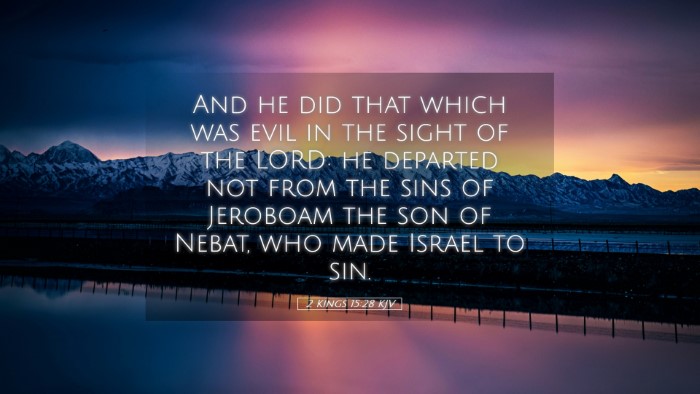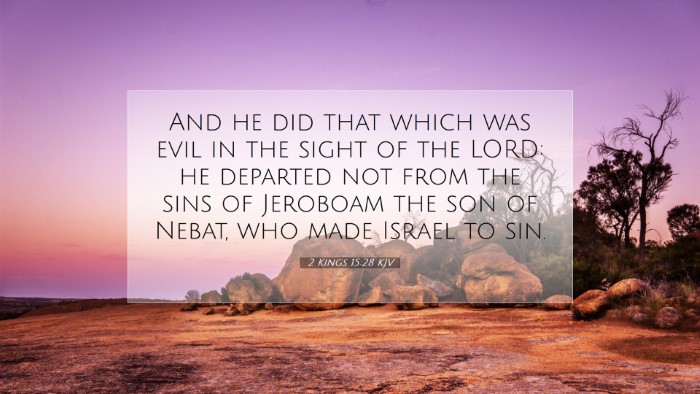Commentary on 2 Kings 15:28
2 Kings 15:28 states: "And he did that which was evil in the sight of the Lord; he departed not from the sins of Jeroboam the son of Nebat, who made Israel to sin." This verse references the reign of King Ahaziah and serves as a critical commentary on the decline of Israel under its kings.
Introduction
This commentary explores the implications of 2 Kings 15:28, drawing insights from esteemed public domain commentaries by Matthew Henry, Albert Barnes, and Adam Clarke. Each of these scholars provides valuable perspectives that contribute to a deeper understanding of the passage.
Examination of King Ahaziah
Ahaziah succeeded his father, Jehoram, and reigned in the kingdom of Israel amidst tumultuous circumstances. His short reign, marked by moral decay, exemplifies the ongoing struggle between adherence to Yahweh and the temptations of idolatry.
Matthew Henry's Perspective
Matthew Henry emphasizes the moral failures associated with Ahaziah's reign. He states:
"Ahaziah’s wickedness was rooted in his failure to break away from the idolatrous practices instituted by Jeroboam, which had set a negative precedent for Israel’s leaders."
Henry notes that the phrase "did that which was evil" signifies a conscious departure from God's ways, highlighting how the spiritual condition of a leader directly impacts the nation.
Albert Barnes' Insight
Albert Barnes provides a theological reflection on the phrase "the sins of Jeroboam." He illustrates that:
"The sins of Jeroboam were not mere cultural practices but symbols of rebellion against God that persisted among the Israelites. Ahaziah’s unwillingness to repent reveals the hardness of heart that had become characteristic of Israel’s kings."
Barnes draws attention to the spiritual implications of these 'sins,' showing how they lead to systemic judgment upon the nation.
Adam Clarke's Analysis
Adam Clarke elaborates on the historical context and narrative surrounding Ahaziah. He writes:
"The consequence of Ahaziah’s choices extended beyond personal failings; they echoed through the attitudes of the people, revealing a widespread spiritual malaise that would complicate Israel's relationship with God."
Clarke notes that this passage reflects on Israel's cyclic downfall due to repeated sinning against God’s commands, leading to eventual judgment.
Theological Implications
Throughout the verse, the phrase "evil in the sight of the Lord" serves as a stark reminder of God's standards. Leaders are called not only to govern wisely but also to exhibit righteousness and devotion to God.
Leadership and Responsibility
- The Role of a Leader: Statutes of leaders are seen as extensions of divine authority. Their choices have lasting impacts on their communities.
- Moral Decay: The persistent cycle of sin attributed to Jeroboam serves as a warning for contemporary leaders about the urgency of moral integrity.
Call to Repentance
The commentary also calls for reflection on the need for personal and corporate repentance. The actions of leaders affect the broader covenant community, and thus calls for a unifying return to God’s ways.
Conclusion
In 2 Kings 15:28, we find a powerful lesson about leadership, legacy, and covenantal faithfulness. Scholars like Matthew Henry, Albert Barnes, and Adam Clarke remind us that the sins of past generations can have profound implications for current times. As the church contemplates its own practices today, the call of this verse remains: to turn away from sin and toward the holiness of God.


